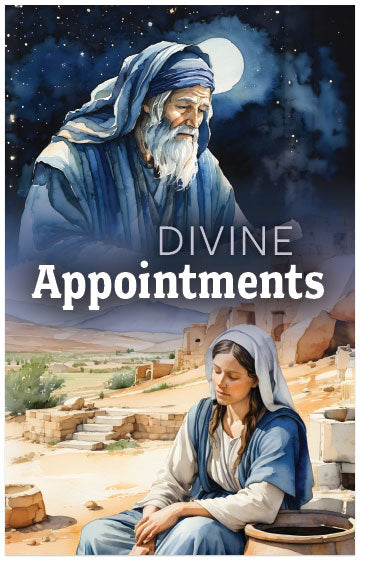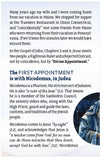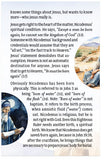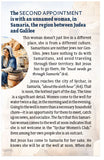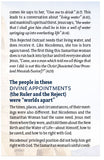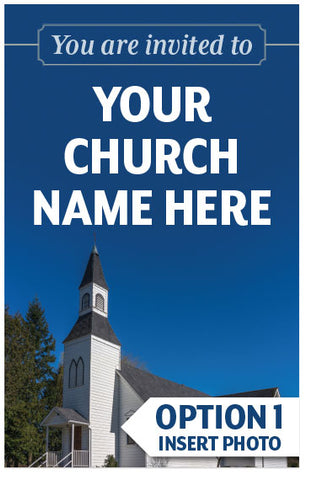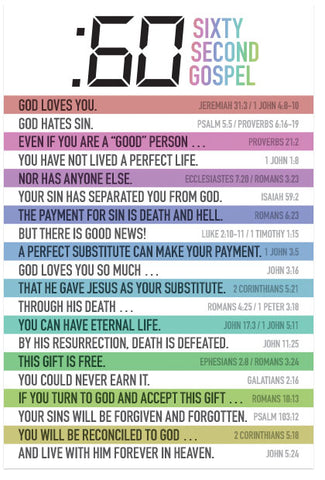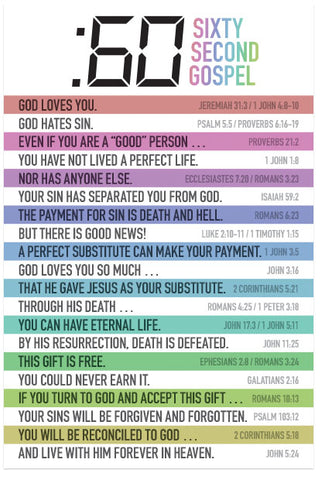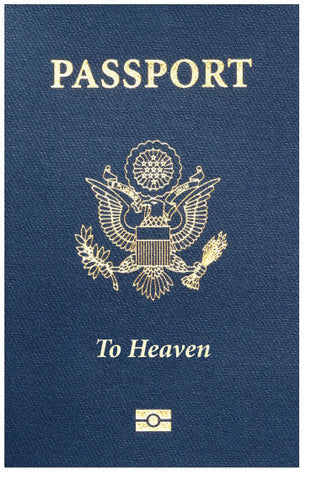Divine Appointments
Special-Order Folded Tract
 NOTE: This item is custom-printed to order (click for more details).
NOTE: This item is custom-printed to order (click for more details).
This tract is from our print-on-demand library, and is not kept in stock. Select the options below, and we will custom-print a batch just for you. Because this item is custom-printed, you can add your custom imprint to the back page at no extra cost.
- Estimated shipping date: Thursday, December 4 (Click for more details)
- SKU:
- Discounts: Discount coupons do not apply to this item
- Format: Folded Tract
- Size: 3.5 inches x 5.5 inches
- Pages: 6
- Imprinting: Available with 2 lines of custom text
- Version: KJV
- Returns: Because this item is custom-printed to order, it cannot be returned.
Show all item details
The full text of this tract is shown below in the KJV version. (Do you want to print this tract in a different version than the one listed? Contact us and let us know what you're looking for—we may be able to create the alternate version for you at no charge.)
Many years ago my wife and I were coming home from our vacation in Maine. We stopped for supper at the Travelers Restaurant in Union Connecticut, and “coincidentally” met some friends from Maine who were returning from their vacation in Pennsylvania. If we’d been five minutes later we would have missed them.
In the Gospel of John, Chapters 3 and 4, Jesus meets two people, a Righteous Ruler and a Rejected Outcast, not by coincidence, but by “Divine Appointment.”
The First appointment is with Nicodemus, in Judea
Nicodemus is a Pharisee, the strictest sect of Judaism. He is also “a ruler of the Jews” (3:1). That means he is a member of the Sanhedrin Council, the seventy elders who, along with the High Priest, guard and guide the laws, customs, and traditions of the Jewish people.
Nicodemus comes to Jesus “by night” (3:2), and acknowledges that Jesus is “a teacher come from God: for no man can do these miracles that thou doest, except God be with him” (3:2). Nicodemus knows some things about Jesus, but wants to know more—who Jesus really is.
Jesus gets right to the heart of the matter, Nicodemus’ spiritual condition. He says, “Except a man be born again, he cannot see the kingdom of God” (3:3). Someone with Nicodemus’ background and credentials would assume that they are “all set,” “on the fast track to Heaven.” Jesus’ statement demolishes that assumption. Heaven is not an automatic destination for anyone. Jesus says that to get to Heaven, “Ye must be born again” (3:7).
Obviously Nicodemus has been born physically. This is referred to in John 3 as being “born of water” (3:5), and “born of the flesh” (3:6). Note: “Born of water” is not baptism. It refers to the birth process, when amniotic fluid (“water”) comes out. Nicodemus is religious, but he is not right with God. Even this Righteous Ruler needs another birth, a spiritual birth. We know that Nicodemus does get saved/born again, because in John 19:39, after the crucifixion, he brings things that are necessary to prepare Jesus’ body for burial.
The second appointment is with an unnamed woman, in Samaria, the region between Judea and Galilee
This woman doesn’t just live in a different place, she is from a different culture. Samaritans are neither Jews nor Gentiles. Jews have nothing to do with Samaritans, and avoid traveling through their territory. But Jesus has to go there, He “must needs go through Samaria” (4:4).
Jesus reaches the city of Sychar, in Samaria, “about the sixth hour” (4:6). That is noon, the hottest part of the day. The time is a significant detail. Women come to the well for water twice a day, in the morning and in the evening. Going to the well is more than a necessary household chore—it is an opportunity for them to meet, catch up on news, and socialize. The fact that this Samaritan woman comes to the well at noon indicates that she is not welcome in the “Sychar Women’s Club.” Even among her own people she is an outcast.
But Jesus has come to Samaria for her sake. He knows she will be at the well at noon. When she comes He says to her, “Give me to drink” (4:7). This leads to a conversation about “living water” (4:10), and mankind’s spiritual thirst. Jesus says, “the water that I shall give him shall be in him a well of water springing up into everlasting life” (4:14).
This Rejected Outcast needs that living water, and does receive it. Like Nicodemus, she too is born again/saved. The first thing this Samaritan woman does is run back into Sychar and tell everyone about Jesus, “Come, see a man which told me all things that ever I did: is not this the Christ [Anointed One/Promised Messiah/Savior]?” (4:29).
The people in these divine appointments (the Ruler and the Reject) were “worlds apart”
The times, places, and circumstances, of their meetings were also different. But Nicodemus and the Samaritan Woman had the same need. Jesus met them where they were, and told them about the New Birth and the Water of Life—about Himself, how to be saved, and how to be right with God.
Nicodemus’ privileged position did not help him get right with God. The Samaritan woman’s sinful condition did not prevent her from getting right with God. Notice that Jesus said “Whosoever” to both of them:
To Nicodemus: “Whosoever believeth in him [in Jesus alone for salvation] should not perish, but have eternal life” (John 3:15).
To the Samaritan woman: “Whosoever drinketh of the [spiritual] water that I shall give him shall never thirst” (John 4:14).
Friend, there is another “Whosoever” in the Bible, just for you: “Whosoever shall call upon the name of the Lord shall be saved” (Romans 10:13).
Jesus is ready for a divine appointment with you
He will meet you where you are. Come to Him. Admit your sin, and your need—that you need to be born again, that you need the Water of Life which only He can give. Ask Jesus to save you and He will—just like he saved Nicodemus and the Samaritan woman.
Blessings to you! Daniel Benton

